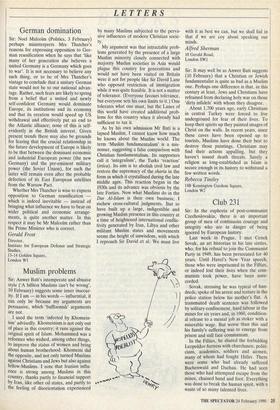Muslim problems
Sir: Anwer Bati's intemperate and abusive • style (`A billion Muslims can't be wrong', 10 February) suggests some inner insecur- ity. If! am — in his words — influential, it can only be because my arguments are persuasive, which 'buffoonish' arguments are not.
I used the term 'infected by Khomein- Ism' advisedly. Khomeinism is not only out of place in this country; it runs against the original spirit of Islam. Mohammed was a reformer who wished, among other things, to improve the status of women and bring about human brotherhood. Khomeini did the opposite, and not only turned Muslims against Christians and Jews but also against fellow-Muslims. I note that Iranian influ- ence is strong among Muslims in this country, thanks partly to financial support by Iran, like other oil states, and partly to the feeling of disorientation experienced
by many Muslims subjected to the perva- sive influences of modern Christian socie- ty.
My argument was that intractable prob- lems generated by the presence of a large Muslim minority closely connected with majority Muslim societies in Asia would plague this country for generations and would not have been visited on Britain were it not for people like Sir David Lane who opposed restriction of immigration while it was quite feasible. It is not a matter of tolerance. (Everyone favours tolerance, but everyone sets his own limits to it.) One tolerates what one must, but the Lanes of this world have created additional prob- lems for this country when it already had sufficient to tax it.
As by his own admission Mr Bati is a lapsed Muslim, I cannot know how much he knows about the Muslim world. The term 'Muslim fundamentalism' is a mis- nomer, suggesting a false comparison with Christian fundamentalism. Its supporters call it integralism', the Turks 'reaction' (irtica). Its aim is to abolish civil law and restore the supremacy of the sharia in the form in which it crystallised during the late middle ages. This reaction began in the 1930s and its advance was obvious by the late Forties. Now what Muslims do in the Dar AI-Islam is their own business; I eschew cross-cultural judgments. But to have built up a large, indigestible and growing Muslim presence in this country at a time of heightened international conflic- tivity generated by Iran, Libya and other militant Maslim states and movements seems the height of unwisdom, with which I reproach Sir David et al. We must live with it as best we can, but we shall fail in that if we are coy about speaking our minds.
Alfred Sherman
10 Gerald Road, London SW I


















































 Previous page
Previous page